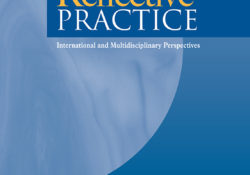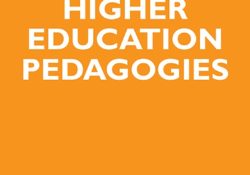eric.ed.gov har udgivet: Educators today are faced with learning to implement the Common Core Standards in Language Arts and Math. Administrators are requiring grade level general education teachers/special education teachers to meet in Private Learning Communities in order to discuss the best ways to implement the CCS as well as to discuss best practices for writing instruction through close analysis of student writing. Research suggests that students use both cognitive and social processes when composing a writing piece (MacArthur, Graham, & Fitzgerald, 2006). Therefore, this study evaluates the importance of first using the social cultural writing process in order to enhance the cognitive writing process of students before they responded to a writing prompt. The study involved administering a journal entry pre-test, post-test, and final test over a four-week time… Continue Reading →
Like this:
Like Loading...

tandfonline.com har udgivet en rapport under søgningen “Teacher Education Mathematics”: Abstract Formulae display:?Mathematical formulae have been encoded as MathML and are displayed in this HTML version using MathJax in order to improve their display. Uncheck the box to turn MathJax off. This feature requires Javascript. Click on a formula to zoom. Abstract This study aimed to develop a second-language willingness to write (L2WTW) model for foreign language writing classrooms. For this purpose, based on previous empirical studies, a hypothesized framework that describes the relationship between L2 motivation, L2 learners’ attitude, autonomy, self-confidence, teacher/peer feedback, and knowledge of genre and L2WTW were proposed. Then, the model, which integrated a mixture of psychological, cognitive, textual, and contextual variables, was tested by using structural equation modeling (SEM). One hundred and ninety-five upper-intermediate English… Continue Reading →
Like this:
Like Loading...
tandfonline.com har udgivet en rapport under søgningen “Teacher Education Mathematics”: ABSTRACT ABSTRACT Technical writing skills are vital to professional engineers, but many engineering students find them difficult to master. This paper presents a case study carried out among ~300 first and second year engineering students who had little previous experience in technical writing. The aim was to support them to write better technical reports. Students were asked to write an 800-word report following an experimental laboratory and to include written reflection on their work. This improved writing skills (as measured by mark awarded and by questionnaires completed by students before and after the activity) by encouraging self-regulation and had the additional benefit that students were more satisfied with and engaged with the feedback they received on their work. Link til… Continue Reading →
Like this:
Like Loading...
tandfonline.com har udgivet en rapport under søgningen “Teacher Education Mathematics”: Effects of assistive technology for students with reading and writing disabilities Link til kilde
Like this:
Like Loading...
eric.ed.gov har udgivet: Teachers in Kentucky are using portfolios to determine strengths and weaknesses of individual students. Consequently, instruction is centered totally around the student. The implementation of portfolios sends the message to students that their first efforts should not be their last. Revision is part of improvement, and students are expected to reevaluate so that their portfolios represent their best work. The rationale and procedures for using mathematics and writing portfolios in Kentucky schools are explored. The use of portfolios grows from the Kentucky Educational Reform Act and is part of the performance based assessment mandated in 1992. The mathematics portfolio for grade 4, presently in use, contains a table of contents, a letter to the reviewer, and five to seven entries that reflect the students’ best work in… Continue Reading →
Like this:
Like Loading...
eric.ed.gov har udgivet: Literature suggests that the mathematical language of teachers impacts a student’s understanding of math concepts. When teachers unintentionally use ambiguous language, students’ understanding of a subject can be negatively affected. We share background on specific instances in which teachers can create confusion with the language they use, and we investigate both pre-service teachers’ and college algebra students’ concepts of three common terms in mathematics: Solve, Evaluate, and Simplify by asking both groups to unpack their understanding of these terms through a writing prompt. We compare the language used by both groups in their definitions. Preservice teachers’ reflections on their experience with the writing prompt are also examined to identify ways that such a task can help them identify gaps in their own understanding and in their thinking… Continue Reading →
Like this:
Like Loading...

tandfonline.com har udgivet en rapport under søgningen “Teacher Education Mathematics”: ABSTRACT ABSTRACT Reflective journals are used in the literature to promote students’ learning, develop writing skills, assess students’ reflection level, promote teachers’ professional development, and gather research data. However, the current research bridges the gap in the literature by exploring the impact of students’ reflective journals on informing instructional practices in an EFL writing context at a university in Qatar. Informed by Gibb’s reflective cycle (1988) (i.e. description, feelings, evaluation, conclusion and action) and social constructionism, the researcher developed a reflective journal to help students reflect on the instructional practices. Using a case study methodology, the researcher collected seventy-eight reflective journals, written by bilingual female university students in Qatar. Data was analysed qualitatively using thematic content analysis. Findings revealed that… Continue Reading →
Like this:
Like Loading...
eric.ed.gov har udgivet: Katie Hern is an English Instructor at Chabot College and Co-Founder of the California Acceleration Project (CAP), a professional development network that supports the state’s 113 community colleges to transform remediation and increase student completion and equity. Hern speaks nationally on remediation reform and integrated reading and writing. Her publications focus on the need to rethink placement, design principles for teaching accelerated English and math, pedagogy for integrated reading and writing, and the equity imperative of transforming remediation. In this interview with Norman Stahl, Hern discusses the changes within the field of developmental education across the past decade, and her hopes for the field going forward. Link til kilde
Like this:
Like Loading...
tandfonline.com har udgivet en rapport under søgningen “Teacher Education Mathematics”: Abstract Abstract After third grade, students’ motivation and enjoyment of writing begins to wane, and this trend continues through most of their education. Middle grade students especially need high-quality writing instruction; however, many teachers report feeling inadequately prepared to teach writing. To combat these issues, teacher preparation programs should understand how their preservice teachers feel about writing and teaching writing. The present study surveyed 150 middle grade preservice teachers to determine their self-efficacy beliefs about writing and writing instruction. Results indicate that preservice teachers valued writing, but did not feel confident with many specific aspects of writing instruction. Link til kilde
Like this:
Like Loading...
eric.ed.gov har udgivet: A Traumatic Brain Injury (TBI) changes cognition and behavior in students. Their learning needs are different from students with other exceptionalities. General and special education teachers can use specific strategies based on learning style, along with certain resources, with students who have experienced a TBI to promote learning in reading, writing and math, The typical Behavior Improvement Plan of Antecedent, Behavior, Consequences does not work with a child after a TBI. Instead, a Behavior Improvement Plan should be developed based on the student’s learning style after the injury, incorporating his or her physical and cognitive capabilities. (Contains 1 figure.) Link til kilde
Like this:
Like Loading...




